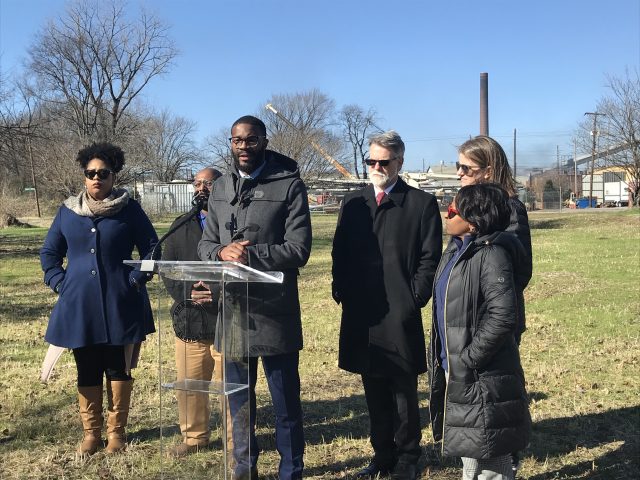
By Erica Wright
The Birmingham Times
Following a meeting with the Environmental Protection Agency (EPA) on Wednesday, Birmingham Mayor Randall Woodfin said progress is being made in North Birmingham community that has been plagued by contaminated soil and other issues.
Standing in a field near the 35th Avenue Superfund Site in North Birmingham, Woodfin said approximately 1,000 plus people have been affected by some of the contaminated soil and the EPA has tested and sampled 1,950 residential properties which is about 98 percent of residential properties within the site.
The EPA has also remediated 473 residential properties, spent approximately $27 million on cleanup activities and have listed 185 residential properties that remain to be addressed, said the mayor.
The mayor spoke after meeting with Steven Cook, the deputy assistant administrator of the EPA.
“Our conversation has been centered around three things, remediation, relocation as well as redevelopment of this area,” Woodfin said. “Our conversation with the administrator… was really on a human element of this. This is not about statistics or numbers; this is about people.”
Joining Woodfin were representatives from the offices of Sen. Doug Jones and Congresswoman Terri Sewell and Charlie Powell, the founder and president of People Against Neighborhood Industrial Contamination (PANIC).
Powell, who has been a resident of North Birmingham for more than 40 years, said a lot of good came out of Wednesday’s meeting.
“We [participants who met with the EPA] finally got the chance to get on the same page and that’s where we’ve been lacking, in good communication,” he said. “Now, we’ve got good communication going on, there is a very good chance of everybody getting exactly what they want. PANIC has always said we wanted to relocate the [residents] that want to be relocated and the ones that don’t, compensate them for being here.”
Woodfin said officials must deal with the distrust that residents have after former Alabama state lawmaker Oliver L. Robinson was convicted of taking bribes to help fight environmental cleanup efforts in mostly black areas in the city, including North Birmingham.
Because of that distrust, the city has to be transparent, said Woodfin.
“We can never overcommunicate enough what’s happening on this site to address remediation if people want to continue to live here,” said Woodfin. “In addition to that, for those who don’t want to live here there is going to have to be some conversation [about money] . . . from the federal government that exists for [remediation, relocation, redevelopment] … and if we can’t get it from the EPA, then where can we get those resources for folks who need assistance here.”
Woodfin also announced he is establishing a working group consisting of city, federal, housing, health and community members that will focus on the future of the Superfund site and people who choose to stay or leave North Birmingham.
“It’s taking a deeper dive and not just vision casting but being able to execute on a plan moving forward for the residents of this area,” he said, “. . . in the first quarter of the year, we’ll start convening folks. A lot of the groups I just named, we’ve been in a room together before… and 100 percent of that conversation was centered around what we wanted from the EPA and the federal government in addressing this site with federal resources.”




